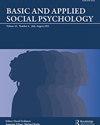通过相信一个公正的世界,不公正和死亡率是否会影响二次受害?
IF 1.8
3区 心理学
Q2 PSYCHOLOGY, SOCIAL
引用次数: 0
摘要
摘要根据正义世界理论,人们需要相信一个正义的世界。从理论上讲,面对不公正和死亡威胁着这种信念,促使人们试图恢复这种信念。过去的研究发现,对无辜者的伤害和死亡率的显著性促使观察者进行二次伤害(例如,指责或贬损受害者,低估他们的痛苦)。从理论上讲,二次受害有助于恢复人们对世界公正的看法。为了测试NBJW是否可以解释这些影响,三个实验在概念上复制了以前依赖于这个过程解释的工作。尽管我们的目标是测试NBJW是否可以测量,并可能解释为什么会发生二次伤害,但我们没有发现暴露在不公正或死亡率显著性下对二次伤害的任何实质性影响。本文章由计算机程序翻译,如有差异,请以英文原文为准。
Do Injustice and Mortality Salience Impact Secondary Victimization Through the Need to Believe in a Just World?
Abstract According to just-world theory, people need to believe in a just world (NBJW). Theoretically, exposures to injustice and confronting mortality threaten this belief, prompting attempts to restore it. Past research has found that victimization of innocents and mortality salience prompts observers to engage in secondary victimization (e.g., blaming or derogating victims and underestimating their suffering). Theoretically, secondary victimization helps restore perceptions that the world is just. To test whether NBJW might explain these effects, three experiments conceptually replicated prior work relying on this process explanation. Although our goal was to test whether NBJW could be measured and might explain why secondary victimization occurs, we failed to find any substantive effects of exposure to injustice or mortality salience on secondary victimization.
求助全文
通过发布文献求助,成功后即可免费获取论文全文。
去求助
来源期刊

Basic and Applied Social Psychology
PSYCHOLOGY, SOCIAL-
CiteScore
4.50
自引率
12.50%
发文量
7
期刊介绍:
Basic and Applied Social Psychology (BASP) emphasizes the publication of outstanding research articles, but also considers literature reviews, criticism, and methodological or theoretical statements spanning the entire range of social psychological issues. The journal will publish basic work in areas of social psychology that can be applied to societal problems, as well as direct application of social psychology to such problems. The journal provides a venue for a broad range of specialty areas, including research on legal and political issues, environmental influences on behavior, organizations, aging, medical and health-related outcomes, sexuality, education and learning, the effects of mass media, gender issues, and population problems.
 求助内容:
求助内容: 应助结果提醒方式:
应助结果提醒方式:


